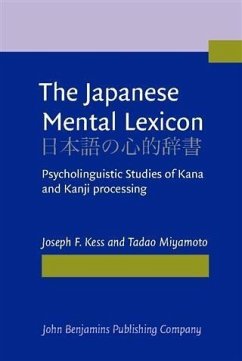
Soliloquy in Japanese and English (eBook, PDF)

PAYBACK Punkte
50 °P sammeln!
Language is recognized as an instrument of communication and thought. Under the shadow of prevailing investigation of language as a communicative means, its function as a tool for thinking has long been neglected in empirical research, vis-a-vis philosophical discussions. Language manifests itself differently when there is no interlocutor to communicate and interact. How is it similar and how does it differ in these two situations-communication and thought? Soliloquy in Japanese and English analyzes experimentally-obtained soliloquy data in Japanese and in English and explores the potential ut...
Language is recognized as an instrument of communication and thought. Under the shadow of prevailing investigation of language as a communicative means, its function as a tool for thinking has long been neglected in empirical research, vis-a-vis philosophical discussions. Language manifests itself differently when there is no interlocutor to communicate and interact. How is it similar and how does it differ in these two situations-communication and thought? Soliloquy in Japanese and English analyzes experimentally-obtained soliloquy data in Japanese and in English and explores the potential utility of such data for delving into this uncharted territory. It deals with five topics in which elimination from discourse of an addressee is particularly relevant and significant. Four are derived from Japanese: the sentence-final particles ne and yo, deixis and anaphora, gendered speech, linguistic politeness; the fifth topic is the use of the second person pronoun you in soliloquy in English.
Dieser Download kann aus rechtlichen Gründen nur mit Rechnungsadresse in A, B, BG, CY, CZ, D, DK, EW, E, FIN, F, GR, HR, H, IRL, I, LT, L, LR, M, NL, PL, P, R, S, SLO, SK ausgeliefert werden.













